10 Best Solar Industry Courses Online Reviewed

The solar industry is rapidly expanding as more and more individuals and businesses recognize the importance of renewable energy. Enrolling in an online solar industry course can be a valuable investment if you’re interested in pursuing a career in the solar industry or want to enhance your knowledge. With numerous options available, choosing the best course that suits your needs can be overwhelming.
That’s why we’ve reviewed the top online solar industry courses to help you make an informed decision. This article highlights the key features, curriculum, and benefits of these top solar energy courses—an overview of the most comprehensive options for beginning or advancing your solar career. Our site’s solar industry course reviews will help you select the best solar industry courses for your needs, whether you’re a professional or a beginner.

EDX
“Discover Solar Energy and Learn to Deploy a PV System” is a program offered by the Delft University of Technology that introduces solar energy and the skills necessary to design and deploy photovoltaic (PV) systems. It is designed for professionals, entrepreneurs, and individuals who want to gain knowledge in solar energy and contribute to their local communities by implementing clean and sustainable energy solutions.
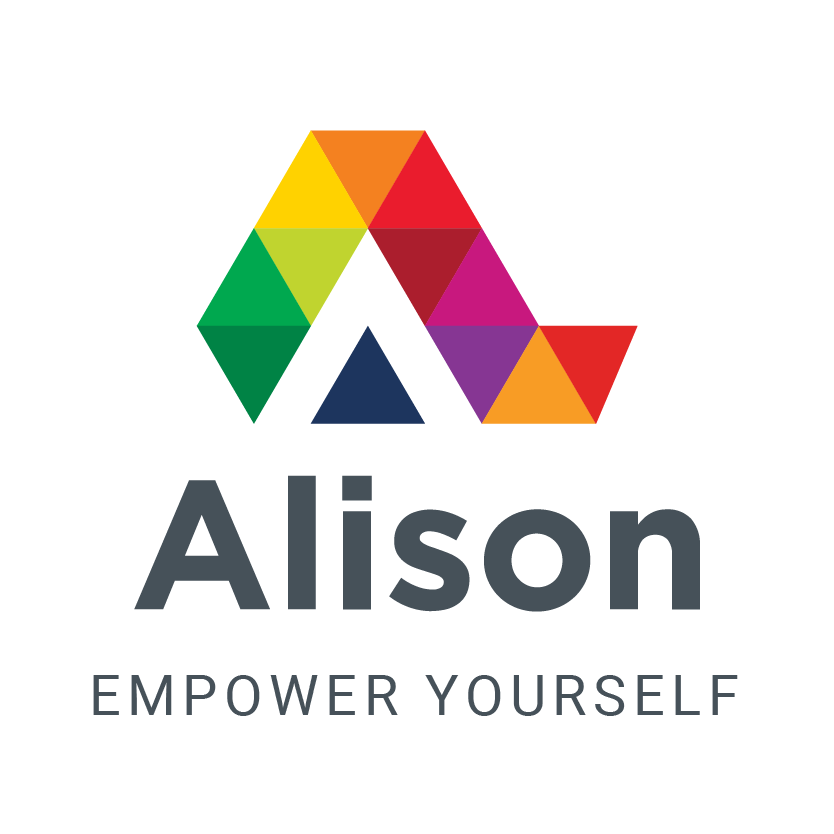
Alison
The Alison Diploma in Solar Energy Engineering is suitable for individuals interested in achieving a career in solar energy courses and renewable energy education. It is perfect for students with a background in engineering, physics, or a related field who wish to specialize in solar energy. This course is also suitable for professionals already working in the renewable energy industry who want to enhance their knowledge in solar energy engineering and applications.

Coursera
Solar Energy Basics Course is a course that provides an overview of solar power and its applications in solar panel systems and solar installations. The course covers solar energy fundamentals, including its comparison to other energy resources and converting sunlight into electricity through photovoltaics (PV). Students will gain knowledge of the components and functions of a basic photovoltaic system found in homes or commercial buildings.
What is the solar industry?
The solar industry refers to the sector of the economy involved in developing, manufacturing, installing, and maintaining solar energy systems. Solar energy is derived from the sun’s radiation. It can be harnessed and converted into usable electricity or heat through various technologies such as photovoltaic (PV) panels and solar thermal systems.
The solar industry encompasses various activities and entities, including solar panel manufacturers, solar cell producers, solar equipment suppliers, solar project developers, solar installation companies installing solar panels, and solar energy service providers. These entities work together to facilitate the adoption and utilization of solar energy as a renewable and sustainable power source.
The solar industry has experienced significant growth in recent years due to technological advancements, declining solar equipment costs, and increased environmental consciousness. Solar power offers numerous benefits, including reduced greenhouse gas emissions, lower electricity bills, energy independence, and job creation.
What are the benefits of taking solar industry courses online?

There are several benefits of taking solar industry courses online:
- Flexibility: Online courses provide flexibility in terms of when and where you can study. You can access course materials and lectures at your convenience, allowing you to balance your learning with other commitments such as work or personal responsibilities.
- Access to Quality Education: Online courses offer access to high-quality educational content and expert instructors worldwide. You can learn from industry professionals and experts with practical solar industry experience.
- Cost-Effectiveness: Online courses are often more affordable compared to traditional in-person training. You can save on travel costs since you can study from home. Additionally, online courses sometimes offer financial aid or scholarships, making them more accessible.
- Self-Paced Learning: Online courses often provide self-paced learning options, allowing you to learn quickly. This flexibility benefits individuals with different learning styles and those who prefer to spend time on challenging topics.
- Networking Opportunities: Many online courses include discussion forums, chat platforms, or online communities where you can interact with fellow students, instructors, and professionals in the solar industry. It provides opportunities for networking, sharing knowledge, and collaborating on projects.
- Updated Content: The solar industry constantly evolves, with new technologies, regulations, and best practices emerging. Online courses are often updated regularly to reflect these changes, ensuring you receive the most up-to-date information.
- Career Advancement: You can enhance your knowledge and skills in the solar industry by taking online courses. It can improve your career prospects and open up opportunities for employment or advancement in the solar industry.
Overall, online solar industry courses offer convenience, cost-effectiveness, and access to quality continuing education elsewhere, making them a valuable option for individuals interested in pursuing a career or expanding their knowledge in the solar industry.
What are the best solar industry courses online?
Solar Energy Basics Course
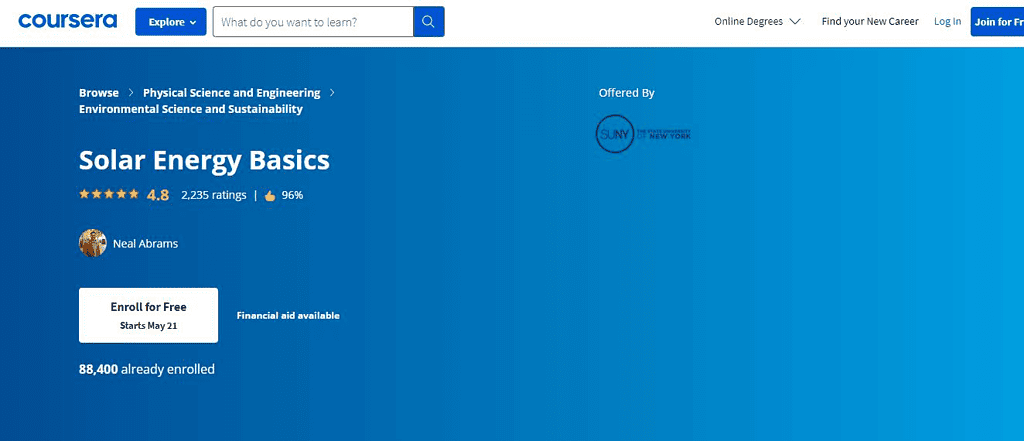
Solar Energy Basics Course is an introductory course that provides an overview of solar power and its applications in solar panel systems and solar installations throughout. The course covers solar energy fundamentals, including its comparison to other energy resources and converting sunlight into electricity through photovoltaics (PV). Students will gain knowledge of the components and functions of a basic photovoltaic system found in homes or commercial buildings.
The course also includes instructions on calculating the electrical demand of a building, reducing overall demand, and designing a solar panel system capable of meeting that demand at a specific location. Students will explore different pricing models used in the industry and gain knowledge of key regulatory considerations for grid-tied systems, where a building is connected to the electrical grid and generates electricity from solar panels.
The capstone solar installer design project in this course involves conducting a simple audit site analysis of a building to determine energy demand and selecting components to design a solar panel system that meets that demand.
Who Is Suitable For This Course?
This course suits individuals interested in gaining a foundational understanding of solar power systems and their design. It can benefit anyone looking to enter the solar industry or expand their knowledge of renewable energy. Prior experience or specific background in solar technologies is optional to enroll in the course.
What Are The Features & Course Content?
- Introduction to solar power systems (Week 1): This module provides an overview of energy sources available on Earth and how solar power fits into the energy mix. Participants will gain knowledge of the components of a solar panel system and how solar panels convert sunlight into electricity.
- Determining energy needs and sizing a PV system (Week 2): Participants will learn how to assess the energy consumption at a location and choose the size requirements of a photovoltaic system to meet that demand. Calculations for power and energy of appliances and photovoltaics will be covered, along with estimating energy production potential based on sunlight availability.
- The growth of photovoltaic markets (Week 3): This module explores the historical development of photovoltaics, current market trends, and future forecasts at a global and national level. Participants will also learn about various photovoltaic applications beyond residential and commercial systems.
- Infrastructure of Photovoltaics (Week 4): This module focuses on the different stakeholders and job opportunities in the industry. Participants will also become familiar with certifications available for professionals in the field and financial models associated with on-grid PV systems.
- Basics of Solar Power Capstone (Week 5): In the capstone project, participants will apply the skills and knowledge gained throughout the course. They will evaluate a site’s location, calculate its energy consumption, aim to reduce the load and design a solar array that can meet the total energy demand.
What Are The Duration And Price?
This course is designed to take five weeks to complete. Each week requires approximately 3-4 hours of study time. The course cost may vary depending on the platform or institution offering it. Please refer to the specific course provider for accurate pricing information.
Pros:
- Comprehensive Introduction: The course covers many topics, providing a thorough understanding of solar power and photovoltaic systems.
- Practical Application: Learners will learn to design and install solar panel systems for houses or buildings.
- Component Understanding: The course teaches the function and importance of key components in a photovoltaic system.
- Demand Calculation: This course teaches students how to calculate a building’s electrical demand and design a solar panel system to meet it.
- Pricing and Regulatory Considerations: The course covers pricing models and regulatory aspects of grid-tied systems.
- Capstone Design Project: The course includes a hands-on design project, allowing learners to apply their knowledge to a real-world scenario.
Cons:
- Limited in-depth coverage of advanced or specialized topics
- It may require additional learning or resources for specific needs beyond the basics.
What Are People Saying – Reviews

The course is prefect if you want to learn how solar panels work. It’s beneficial to understand the different types of pricing models and what kind of regulations you need to know about before installing a solar panel system. The projects at the end are also really cool and help you understand everything you learned in the course.
Renewable Energy Technology Fundamentals
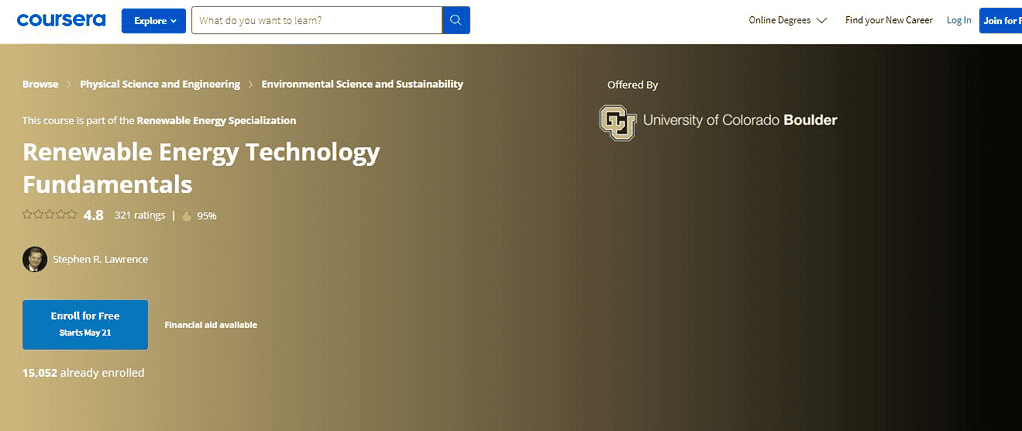
Renewable Energy, Technology Fundamentals Course is a comprehensive online course that aims to provide learners with a solid understanding of renewable energy technologies. It covers key concepts, principles, and applications of renewable energy sources like solar, hydro, wind, biomass, geothermal, and ocean energy. The course also explores energy storage technologies like batteries, pumped hydro, thermal storage, and hydrogen.
This course suits a wide range of individuals interested in renewable energy. Professionals in the energy sector, policymakers, engineers, environmentalists, students, and anyone interested in renewable energy will benefit from this course. It is open to technical and non-technical backgrounds and requires no prior knowledge.
The course features a combination of video lectures, readings, quizzes, and practical exercises to facilitate learning. This engaging and interactive course allows learners to grasp and apply the fundamental concepts.
Who Is Suitable For This Course?
This course suits a wide range of individuals interested in renewable energy. It caters to technical and non-technical professionals who want to understand renewable energy technologies comprehensively. Whether you are a student, professional, or passionate about sustainable energy, this course is designed to accommodate learners with varying levels of technical expertise.
What Are The Features & Course Content?
The course has four modules covering different aspects of renewable energy technologies. These are:
- Energy Fundamentals (Week 1): This module establishes the groundwork by defining energy and exploring its sources, measurements, and rules. It also delves into the fundamental concepts of electricity and how renewable resources can be used for electricity generation.
- Wind Energy (Week 2): Week 2 focuses on wind energy experiencing rapid global growth. It covers the characteristics of wind and the energy extraction from wind through turbines and examines wind turbines’ components, performance, and economics. The module also discusses offshore wind technologies.
- Solar Energy (Week 3): In this module, the course explores solar energy, the most abundant renewable energy source. It examines the attributes of solar radiation, various ways to harness sunlight for electricity generation, and introduces photovoltaic (PV) technologies. Solar PV project applications, planning, and economics, are also discussed.
- Other Renewable Energy Technologies (Week 4): The final module covers different renewable energy technologies such as hydroelectric power, biomass energy, concentrating solar power, geothermal power, and ocean energy. It also emphasizes the importance of energy storage technologies for renewable energy. Various storage technologies, including pumped hydro, batteries, thermal, and hydrogen storage, are explored. The module concludes with forecasts for the success of renewable energy generation and storage technologies.
What Are The Duration And Price?
The Renewable Energy Technology Fundamentals Course is a four-week course with an estimated time commitment of three hours per week. The exact duration and price may vary, so checking the Coursera website for the most up-to-date course fees and schedule information is recommended.
Pros:
- Comprehensive coverage: The course provides a comprehensive overview of renewable energy technologies, ensuring learners gain a broad understanding of the subject.
- Accessible to a wide audience: The course caters to technical and non-technical individuals, making it suitable for diverse learners.
- Prerequisite knowledge not required: The course starts with foundational concepts, making it accessible to beginners with no prior background in renewable energy.
- Focus on practical applications: The course emphasizes real-world applications and economic considerations, enabling learners to effectively evaluate and recommend renewable energy technologies.
- Modular structure: The course is organized into modules, allowing learners to progress systematically and revisit specific topics if needed.
Cons:
- Lack of advanced technical details: The course may need to provide in-depth technical knowledge or advanced topics, which could be a limitation for learners seeking a more technical understanding of specific renewable energy technologies.
- Limited hands-on experience: Due to the nature of an online course, practical hands-on experience with renewable energy technologies may be limited.
What People Are Saying – Reviews:

I took this course because I’m interested in a career in renewable energy. It was an excellent course. The lectures were clear and concise, and the instructor was very knowledgeable. The quizzes and activities were also very helpful in reinforcing the material. Highly recommend
Solar Energy System Design
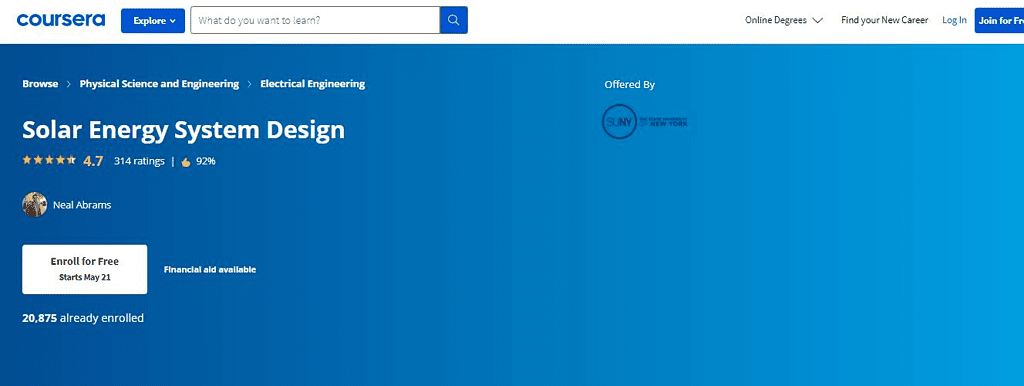
Solar Energy System Design is a course that delves deeper into the design and implementation of photovoltaic (PV) systems for harnessing solar energy. It builds upon the foundational knowledge acquired in the Solar Energy Basics course, focusing on system components, energy calculations, and basic sizing. This advanced course aims to equip learners to incorporate real-world conditions, such as suboptimal positioning and shading, into system design and equipment selection.
This course is best for individuals with a basic understanding of electrical power and energy understanding. It is ideal for professionals and enthusiasts in renewable energy, engineering, or construction fields and those interested in designing and implementing solar energy systems.
Who Is Suitable For This Course?
This course is greatly suited for individuals who have a basic understanding of energy and electrical power and want to expand their knowledge of solar energy. It is ideal for those interested in designing and implementing PV systems, including professionals in the renewable energy industry, engineers, certified energy practitioners, architects, and anyone looking to gain expertise in solar energy system design.
What Are The Features & Course Content?
- Following solar energy from source to panel: This module explores the properties of sunlight and its journey from the Sun to the Earth’s surface, providing a deeper understanding of the solar resource.
- PV module and array circuits: Students delve into the electrical characteristics of PV modules and arrays, analyzing module specifications and learning how voltage and current values impact module performance under different conditions. The module also covers the design of internal module circuits and array circuitry.
- PV sizing and output under various conditions: This module accounts for real-world situations that affect PV system performance, such as suboptimal array positioning, shading, and temperature variations. Students learn how to calculate system sizes and outputs while considering these factors.
- Grid-tie PV system design under real-world conditions: This module integrates the knowledge acquired in the previous modules to guide students through equipment selection and system sizing. It covers site surveying, gathering relevant information, and permitting, where system design and specifications are recorded and communicated.
- Capstone project: The final module tasks students with designing a PV system using commercially available components. They must consider site-specific conditions, including solar radiation availability, losses due to array positioning and shading, and the design of an optimal configuration for connecting PV modules with an inverter. Students also evaluate the accuracy and safety of their PV system design.
What Are The Duration And Price?
The course duration is five weeks, with an estimated total time commitment of 12 hours. However, the duration may vary depending on individual learning speed and engagement. As for the price, it’s advisable to check with the course provider for accurate and up-to-date information.
Pros:
- In-depth knowledge: The course provides a comprehensive understanding of solar energy system design, covering both theoretical concepts and practical applications.
- Real-world considerations: Participants learn how to incorporate real-world conditions, such as suboptimal positioning, shading, and temperature variations, into their system designs, ensuring practical and efficient solutions.
- Hands-on project: This capstone project allows participants to use their skills to design a PV system based on site-specific parameters, which enhances their problem-solving abilities.
- Industry relevance: The course suits professionals working in the solar energy industry or those interested in pursuing a career in renewable energy. It equips participants with valuable skills and knowledge for designing and implementing solar energy systems.
Cons:
- Prior knowledge required: Learners are assumed to have some knowledge of electrical power and energy, which can be a barrier for absolute beginners.
- Limited scope: The course focuses specifically on PV system design and may not cover other aspects of renewable energy.
What People Are Saying – Reviews:

This solar energy system design course is excellent! I’ve completed the Solar Energy Basics course, and this one builds on that foundation. The instructor provides clear explanations with helpful visuals, covers much material, and offers excellent tips. The quizzes are a helpful way to check your understanding too. Thank you!
The complete SOLAR ENERGY course (Beginner to advanced level)
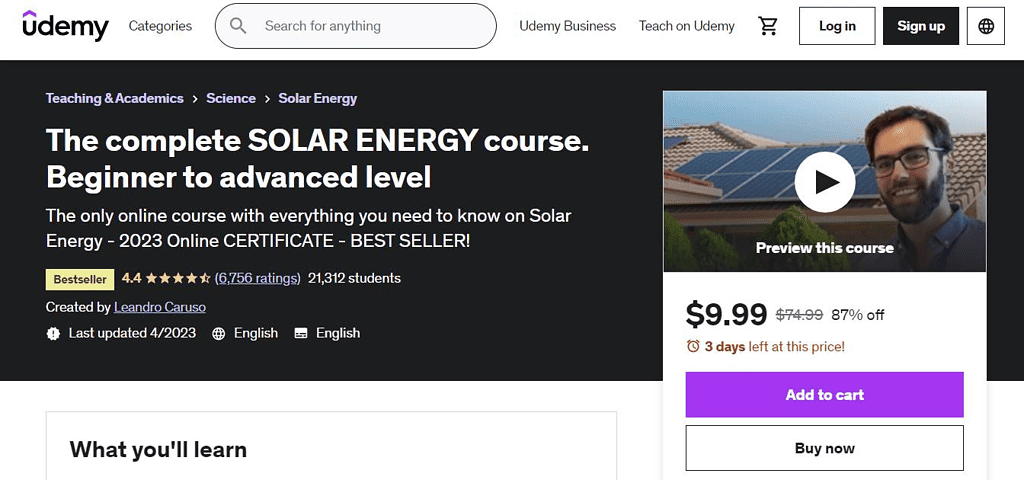
This comprehensive Solar Energy course covers everything you need to know about Solar Photovoltaic (PV) Energy, from beginner to advanced level. It is designed to provide a complete understanding of solar energy systems and empower you to create your own grid-tie PV system. Taught by an Environmental Engineer, this course covers the basics you need to know about solar energy, from beginner to advanced level.
The course offers a unique combination of theoretical knowledge and practical applications, ensuring that students understand solar energy concepts deeply and acquire the skills needed to work in the solar industry. The instructor, who has hands-on experience installing over 200 solar PV systems in Australia and the U.S., shares valuable insights and industry expertise throughout the course.
Who Is Suitable For This Course?
This course suits engineers, solar sales professionals, entrepreneurs, enthusiasts, and anyone wanting to gain comprehensive solar PV energy knowledge. The instructor is an environmental engineer with extensive experience installing over 200 solar PV systems in Australia and the U.S. The instructor’s previous courses were priced at $1500, making this course an affordable alternative with the same comprehensive content.
What Are The Features & Course Content?
- Introduction to the course, including learning objectives, the future of solar energy, job opportunities, and how to maximize the course’s benefits.
- Fundamentals of solar PV energy, covering PV system applications, advantages and disadvantages, grid-tie vs. off-grid systems, solar PV system functioning, energy production vs. household needs, peak sun hours, power concepts, and units, and a quiz to test your understanding.
- The components of a grid-tie PV system, exploring solar modules, DC/DC converters (optimizers), junction boxes, solar inverters, solar meters, net-metering, wiring fundamentals, electrical diagrams, and a quiz. Field experience testing solar modules and inverters, including reviews and practical demonstrations.
- Design of a grid-tie PV system, covering the four steps of efficient solar PV design, understanding power bills, assessing daytime energy needs, evaluating roof performance for solar, determining peak sun hours for any location, sizing a solar PV system, and a quiz.
- A bonus lecture and the opportunity to claim a prize.
What Are The Duration And Price?
The course has six parts, each lasting approximately 1 hour and 45 minutes. It includes 30 lectures. It offers 2 hours of on-demand video and 25 downloadable resources. The course is accessible on mobile devices and TVs. Upon completion, you will receive a certificate. The course is priced at $9.99 and is available in English.
Pros:
- Comprehensive Content: The course covers everything you need to know about Solar Photovoltaic Energy, from beginner to advanced level.
- Experienced Instructor: The course is taught by an Environmental Engineer with hands-on experience installing over 200 Solar PV systems.
- Job Opportunities: The study provides insights into job opportunities and career profiles in the Solar industry, increasing your chances of securing a full-time job.
- Accessible Anytime, Anywhere: It is available on-demand, so you can get the course from any device and learn at your own pace.
- Cost-effective: This course costs significantly less than other options for Solar Energy training, making it more affordable and accessible.
- Up-to-date Information: The course regularly updates industry trends, ensuring you stay current and well-informed.
- Practical Experience: The course includes field experiences and real-life examples, allowing you to apply theoretical knowledge and gain practical insights.
- Interactive Quizzes: Quizzes throughout the course help reinforce your learning and test your understanding of the topics covered.
Cons:
- Limited Duration: The course is only 2 hours long, which may not be sufficient to cover all aspects of solar energy in depth.
- Limited Hands-on Experience: While the course mentions field experiences and real-life examples, the extent of practical hands-on experience may be limited, which could be a drawback for some learners.
- Lack of Interaction: As an online course, there may be limited opportunities for direct interaction with the instructor or other students, hindering collaborative learning and engagement.
What People Are Saying – Reviews:

This is a great solar energy course for anyone wanting to enter the solar industry. This course instructor is very knowledgeable and passionate about solar energy, and he provides great information in the course. The course is ideal for beginners seeking to learn about solar energy in depth.
The Complete 2022 PV Solar Energy
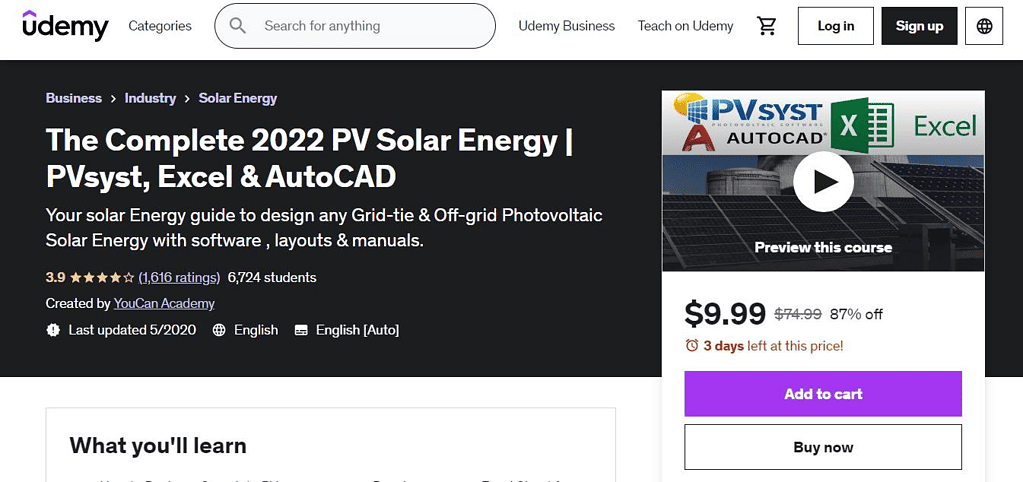
The Complete 2022 PV Solar Energy course is a comprehensive guide to designing Grid-tie and Off-grid Photovoltaic Solar Energy systems using software, layouts, and manuals. The course covers various topics and skills, including designing PV systems from scratch, developing Excel sheets for system calculations, drawing PV system diagrams with AutoCAD, and constructing projects using PVsyst software.
Participants in in-person workshops will also learn how to design Solar Projects for different terrains, analyze and design components such as inverters, batteries, charger controllers, and protection devices, and read datasheets of PV system components. The course includes practical exercises, examples, and instruction on financial and economic analysis of grid-tie solar projects.
Who Is Suitable For This Course?
The course suits renewable energy engineers, energy engineers, electrical engineers, solar energy designers, PV solar energy designers, mechanical engineers, and electrical controlling engineers. No prior experience is required, making it accessible to beginners in the field.
What Are The Features & Course Content?
- Introduction: This content provides an overview of the course and the importance of solar energy as a renewable resource.
- Off-Grid Solar System Main Design: You’ll learn about designing off-grid PV systems, including determining the required angles, understanding different types of solar radiation, calculating solar irradiation, and performing manual calculations for a practical design.
- Excel Software Calculations: This section focuses on using Excel to perform calculations for off-grid system designs. You’ll learn how to design an off-grid system for a specific location, step by step, using New York as an example.
- PV System Main Components: This section covers various components of a PV system, including solar energy technologies, on-grid vs. off-grid systems, solar cells’ principle of operation, solar panels, PV solar tracking technologies, batteries, and more.
- Complete Off-Grid Manual Design: Here, you’ll learn how to design an off-grid PV system using manual calculations. Topics covered include determining required energy and angles, system efficiency calculations, panels and batteries design, charger controller and inverter designs, area design, AutoCAD layout design, and cable and protection devices design.
- Excel Program for Complete Off-Grid Design: This section focuses on using Excel to create a program for the complete structure of an off-grid system. It covers step-by-step calculations and different system connection cases.
- AutoCAD Design for a Complete Off-Grid System: Participants will learn how to use AutoCAD to design a complete off-grid PV system. It includes understanding important AutoCAD commands, creating layout designs, and following step-by-step guidelines.
- Grid-Tie Solar System: This section provides an overview of grid-tie solar systems, including designing steps, manual calculations for a practical example, AutoCAD layout design, and an Excel program for complete grid-tie design.
- PVsyst Software for Grid-Tie & Off-Grid Design: Participants will learn how to use the PVsyst software for designing grid-tie and off-grid PV systems. Topics covered include grid-tie design, off-grid design, and utilizing the software’s features for analysis.
What Are The Duration And Price?
The course consists of 11 sections and 54 lectures and lasts 8 hours and 52 minutes. The price is $9.99.
Pros:
- Comprehensive Coverage: The course covers PV solar system design, including grid-tie and off-grid systems, using popular software tools like PVsyst, Excel, and AutoCAD.
- Practical Learning: The course emphasizes practical learning with hands-on exercises, allowing students to apply their knowledge and gain practical experience designing PV systems.
- Support and Assistance: The instructors offer support and assistance throughout the course, ensuring that students can get help if they encounter any difficulties or have questions.
- Suitable for Beginners: The course is designed for beginners and doesn’t require any prior experience. It provides a step-by-step approach to help beginners grasp the concepts and techniques of PV system design.
- Focus on Financial Analysis: The course covers the financial and economic analysis of grid-tie solar projects, enabling students to understand such projects’ financial aspects and feasibility.
- Diverse Learning Materials: The course includes various learning materials such as manuals, datasheets, and diagrams, enabling students to access multiple resources and enhance their understanding of PV system design.
- Software Proficiency: By learning PVsyst, Excel, and AutoCAD, students can develop proficiency using these software tools. These tools are mostly used for PV system design and analysis.
- Affordable Price: Despite the course’s low price, it is widely accessible to those interested in solar energy design.
Cons:
- Limited Focus: The course focuses primarily on PV system design using specific software tools and manual calculations. If you want a comprehensive understanding of solar energy concepts beyond design, this course may not fulfill those needs.
- Lack of Interactivity: The course may need more interactive elements such as quizzes, assignments, or interactive simulations that could further enhance the learning experience.
What Are People Saying – Reviews

I took this course, and it was amazing! I learned much about renewable energy, solar panels, and PV systems. The instructor was very knowledgeable and went over everything in detail. The course is well worth the money!
Complete Solar Energy Design Course From Zero To Hero
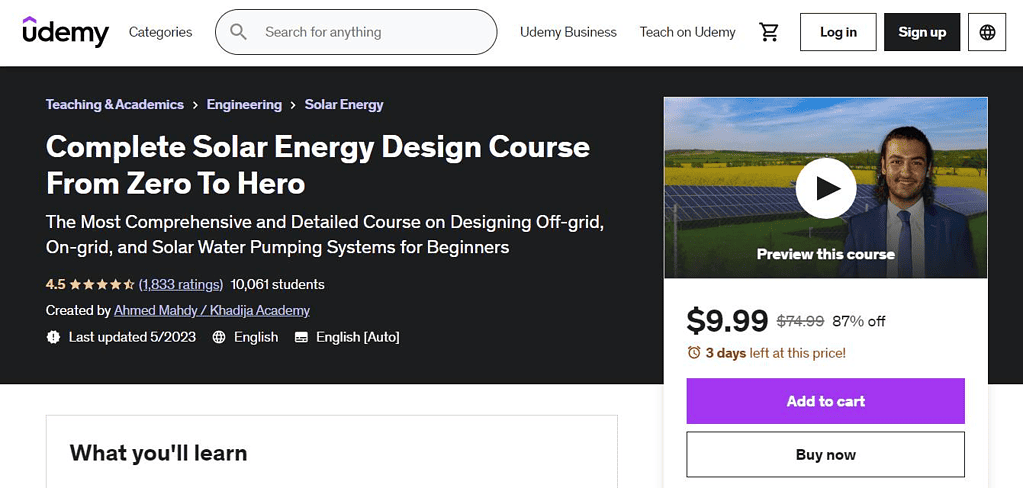
The Complete Solar Energy Design Course From Zero To Hero is a comprehensive and detailed course that covers all aspects of designing solar energy systems. It is intended for beginners with prior solar energy knowledge or experience. The course aims to provide a complete understanding of solar energy and equip participants with the skills and knowledge necessary to design various types of solar systems, including off-grid, on-grid, and solar water pumping systems.
Throughout the course, participants will learn about solar energy fundamentals, how photovoltaic (PV) cells work, the different types, and their efficiency. They will understand the pros and disadvantages of PV cells and the impact of temperature and insolation on power generation. The course covers the different methods of connecting PV cells, the components and design of on-grid and off-grid solar systems, and the selection and sizing of PV modules, inverters, batteries, and solar charge controllers.
Participants in in-person classes will also learn about the design considerations for shading and tilt angle, the installation and mounting of PV panels, and the importance of charge controllers in solar energy systems. The course also touches on AutoCAD and single-line diagram design for PV systems and the basics of MATLAB and ETAP for PV simulation.
Who Is Suitable For This Course?
This course suits solar enthusiasts, electrical power engineers, mechanical engineers, electrical and mechanical students, and anyone interested in knowledge about solar systems or PV systems. It is intended for beginners who have yet to gain experience or knowledge of solar energy.
What Are The Features & Course Content?
- Introduction to PV System: This section provides an overview of photovoltaic (PV) systems and covers topics such as PV cell operation, parallel and series connections of PV cells, advantages and disadvantages of PV cells, and types of solar cells and their efficiency.
- Types of Busbars and Solar Cells: This section discusses different types of busbars and solar cells used in solar energy systems.
- V-I Characteristics of a PV Panel: Here, you will learn about the voltage-current characteristics of a PV panel.
- Different Connections of Solar Panels: This section covers the various methods of connecting solar panels in a PV system.
- Shading and Half-Cut Cells: You will learn about shading effects on PV panels and the concept of half-cut cells.
- Tilt Angle of a PV Panel: This section covers the installation and mounting process of PV panels and calculates the optimal tilt angle for a location.
- Calculation of the Tilt Angle at a Location: You must learn how to calculate the ideal tilt angle for PV panels based on the site of the panels.
- Practical Tilt Angle during Different Seasons: This section discusses the practical considerations for adjusting the tilt angle of PV panels during different seasons.
- Orientation and Azimuth Angle of Solar Panels: You will learn about solar panels’ orientation and azimuth angle for optimal energy production.
- Sun Chart and Distance between PV Rows: This section covers using sun charts and determining the distance between rows of PV panels.
- Panel Parameters and Measurements: Here, you will learn about the parameters and measurements associated with PV panels.
- Junction Box in PV Panels: This section discusses the junction box in PV panels and its wiring process.
- Solar Wires and Cables Installation Process: You will learn about the installation process of solar wires and cables in a PV system.
- PV String Maximum Voltage: This section defines a system’s maximum voltage for PV strings.
- Types and Components of PV Systems: Here, you will learn about the different types of PV systems, including off-grid, on-grid, and hybrid systems, along with their components.
What Are The Duration And Price?
This course consists of 25.5 hours of video-on-demand, two articles, and 20 resources that can be downloaded. Students will have access to the course on mobile and TV platforms and receive a certificate of completion. The price of the course is $14.99.
Pros:
- Comprehensive coverage: The course provides a detailed understanding of solar energy systems, from basic concepts to professional design.
- Hands-on learning: The course includes practical examples, calculations, and design exercises to enhance your understanding and application of the concepts.
- Variety of learning resources: The course offers 25.5 hours of on-demand video content, articles, downloadable resources, and access to mobile and TV platforms. These resources cater to different learning preferences and enable students to study independently.
- Professional guidance: The course instructor is knowledgeable and experienced in solar energy design. Their expertise ensures the content is accurate, up-to-date, and relevant to industry standards.
- Job opportunities: The course will help you gain the skills to pursue a solar energy career.
- Design software usage: The course teaches the use of popular design software such as PVsyst, Autocad, MATLAB, and ETAP. Learning these tools equips students with valuable practical skills in the solar energy industry.
- Certificate of completion: Students get a certificate of completion to show off their newly acquired skills.
- Affordable price: The course is priced at $14.99, making it accessible and affordable for individuals interested in learning about solar energy design.
Cons:
- Lengthy Course: The course consists of 25.5 hours of on-demand video, which may be overwhelming for some learners who prefer shorter, more concise courses.
- Lack of Interactivity: Since it is an on-demand video course, there may be limited opportunities for interactive discussions or hands-on exercises, which can be beneficial for some learners to reinforce their understanding.
What Are People Saying – Reviews

This course is very comprehensive and well-organized. I have never worked with solar panels before, and this course has given me a good foundation to start working with them. It’s a good instructor who knows what she’s talking about. The lectures are clear, concise, and easy to follow.
Discover Solar Energy and Learn to Deploy a PV System
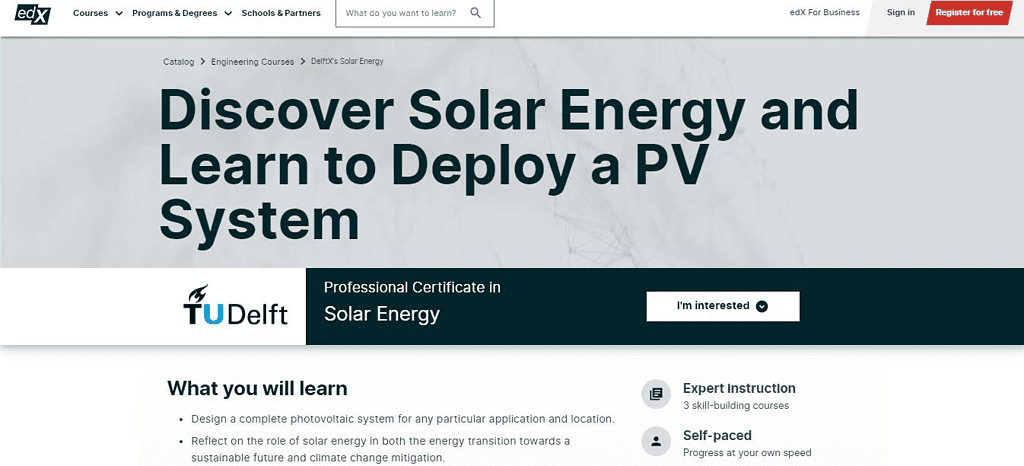
“Discover Solar Energy and Learn to Deploy a PV System” is a program offered by the Delft University of Technology that introduces solar energy and the skills necessary to design and deploy photovoltaic (PV) systems. It is designed for professionals, entrepreneurs, and individuals who want to gain knowledge in solar energy and contribute to their local communities by implementing clean and sustainable energy solutions.
During the course, individuals will learn about the physical principles of photovoltaic energy conversion, the different PV technologies, and their performance, cost, reliability, and circularity. Additionally, solar training will examine solar energy’s role in energy transition and climate change mitigation. Additionally, the solar jobs program covers the design of complete PV systems for various applications, including large-scale utility and residential systems. There is a specific focus in solar training on improving energy access in rural regions through the use of autonomous photovoltaic-battery systems.
Who Is Suitable For This Course?
The course is best for individuals new to solar energy who wish to understand its principles and applications comprehensively. It is suitable for professionals and entrepreneurs who want to venture into the solar energy sector and individuals who are interested in improving access to electricity in their communities through deploying PV systems.
What Are The Features & Course Content?
The program consists of three skill-building courses that can be completed quickly over three months. The courses are:
- From Fundamentals to its Role in the Energy Transition (4 weeks): This course introduces the physical principles of photovoltaic energy conversion in solar cells. It explores the leading role of solar energy in rural electrification and climate change mitigation. This course will teach participants how solar energy works and what to do with it.
- Photovoltaic Materials, Devices, and Modules (4 weeks): This course focuses on the various photovoltaic technologies, from cell to module level. Participants will learn about design rules for solar cells and apply them to different PV technologies. They will also evaluate these technologies’ performance, costs, reliability, and circularity using relevant metrics.
- Photovoltaic Systems and their Applications (4 weeks): In this course, participants will learn to design complete PV systems for various applications, ranging from large solar farms to residential systems. They will gain knowledge in technical and economic assessments of PV systems. The course also explores the integration of solar electricity into the grid for clean and sustainable energy solutions.
What Are The Duration And Price?

The program is self-paced, allowing participants to progress at their speed. It is recommended to allocate 4-6 hours per week for each course. The duration of the entire program is three months. The discounted price for the full program is $483.30, with the pre-discounted price being $537.
Pros:
- Job opportunities: The course provides the knowledge and skills required to pursue career opportunities in the solar energy industry, which is experiencing significant growth and demand.
- Comprehensive learning: The program covers a wide range of topics related to solar energy, including the design of photovoltaic systems, the physical principles of solar energy conversion, and the evaluation of different photovoltaic technologies.
- Practical application: You will learn how to design a complete photovoltaic system for various applications and locations, allowing you to apply your knowledge in real-world scenarios.
- Understanding the energy transition: The course explores the role of solar energy in the transition towards a sustainable future and its contribution to mitigating climate change, providing valuable insights into the importance of renewable energy.
- Access to clean energy solutions: The program also focuses on improving energy access in rural areas by deploying autonomous photovoltaic-battery systems, empowering you to impact your local community positively.
- Expert instruction: The Delft University of Technology experts develop the courses, ensuring high-quality instruction and valuable learning experiences.
- Self-paced learning: You can progress through the lessons quickly, allowing you to balance your education with other commitments.
- Affordable pricing: The program offers a discount, making it accessible and cost-effective for individuals interested in acquiring knowledge about solar energy and PV system deployment.
Cons:
- Limited practical experience: The program focuses on theoretical knowledge and may need more hands-on experience installing and maintaining PV systems, which is essential for real-world applications.
- Language barrier: The program is conducted in English, which may pose difficulties for non-English speakers and hinder their comprehension and engagement
What Are People Saying – Reviews
This program is excellent for learning about solar energy technology. The instructor provides clear explanations, and the course moves quickly. I highly recommend it.
Explore the changes needed to clean up energy supplies.
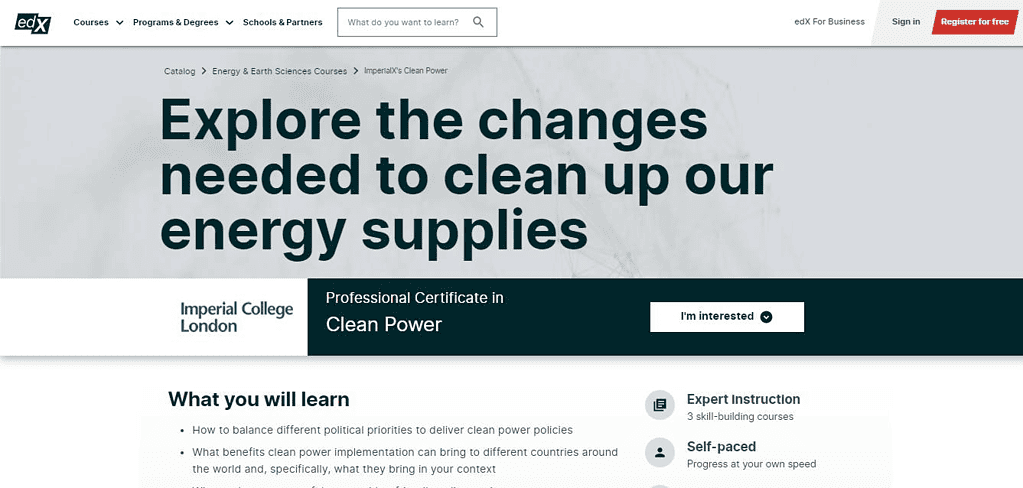
“Explore the changes needed to clean up energy supplies” is a program offered by ImperialX called the Clean Power Professional Certificate. This program is intended to provide individuals with the knowledge and skills to learn the challenges of transitioning to cleaner power sources. The program covers various aspects of clean power, including balancing political priorities, implementing clean power policies, attracting finance for clean power projects, delivering secure and affordable clean power, and successfully integrating a high volume of variable renewables into the grid.
The job outlook section highlights the significant investment in clean energy, estimated at $333.5 billion globally in 2017. It emphasizes the importance of the power sector as the easiest and cheapest starting point for reducing greenhouse gas emissions. The course suggests ample opportunities for entrepreneurs and policymakers in the clean energy sector.
Who Is Suitable For This Course?
The program suits individuals interested in understanding the importance of transitioning to cleaner power sources and who wants to contribute to creating a sustainable energy future. It is particularly relevant for entrepreneurs looking to start businesses in the clean energy sector and policymakers who aim to develop effective strategies and policies to drive change.
What Are The Features & Course Content?
The courses within the program are as follows:
- “Why Move Towards Cleaner Power” (2-5 hours per week, for five weeks): This course explores why it is crucial to clean up our power supply and take immediate action. Participants will gain insights into the situation’s urgency and learn how to present arguments favoring cleaner power in their respective regions effectively.
- “Creating a Pro-Renewables Environment” (2-5 hours per week, for six weeks): As part of the course, you will learn about policy, regulatory, and fiscal measures that can be used to incentivize renewable energy and drive cleaner investment throughout the electricity supply chain. Participants will learn about the various factors contributing to a renewable-friendly policy environment.
- “Incorporating Renewable Energy in Electricity Grids”: Students in this course gain an understanding of managing a high volume of renewable electricity to ensure a cost-effective and reliable supply of electricity. Participants will learn strategies to integrate renewable energy into existing grids successfully.
What Are The Duration And Price?

Each course in the program requires a commitment of 2-5 hours per week, spread over 5-6 weeks. Participants can progress through the program at their own pace, as it is self-paced and flexible. The program can be completed within a timeframe of four months. The discounted price for the full program is $199.80, while the pre-discounted price is $222.
Pros:
- Balancing political priorities: You will learn how to navigate different political priorities to effectively develop and implement clean power policies.
- Global benefits of clean power: The course explores the advantages of implementation in various countries worldwide and provides insights into the benefits it brings in your context.
- Creating a renewables-friendly policy environment: You will understand the necessary policy, regulatory, and fiscal measures to incentivize renewable power and attract cleaner investment throughout the electricity supply chain.
- Drawing finance for clean power projects: The course guides attracting financial support and investment for clean power initiatives.
- Delivering secure and affordable clean power: You will learn strategies and best practices to ensure a reliable and affordable supply.
- Integrating variable renewables into the grid: The course covers techniques for successfully integrating a high volume of renewable energy sources into the electricity grid.
Cons:
- Limited focus: The course may cover only some aspects of clean energy transition comprehensively, potentially overlooking certain important topics or areas of concern.
- Limited instructor interaction: If the course is self-paced and needs more active instructor participation, learners may be able to ask questions in discussions with experts.
- Insufficient depth: Given the relatively short duration of the course (5 weeks), it may not delve deeply into complex topics, leaving participants with a basic understanding but needing more in-depth knowledge.
What Are People Saying – Reviews
This program is excellent! It provides essential information for transitioning to cleaner energy sources. I appreciate the well-organized and easy-to-follow lessons, and the quizzes do an excellent job of testing my understanding. I highly recommend it.
Diploma in Solar Energy Engineering
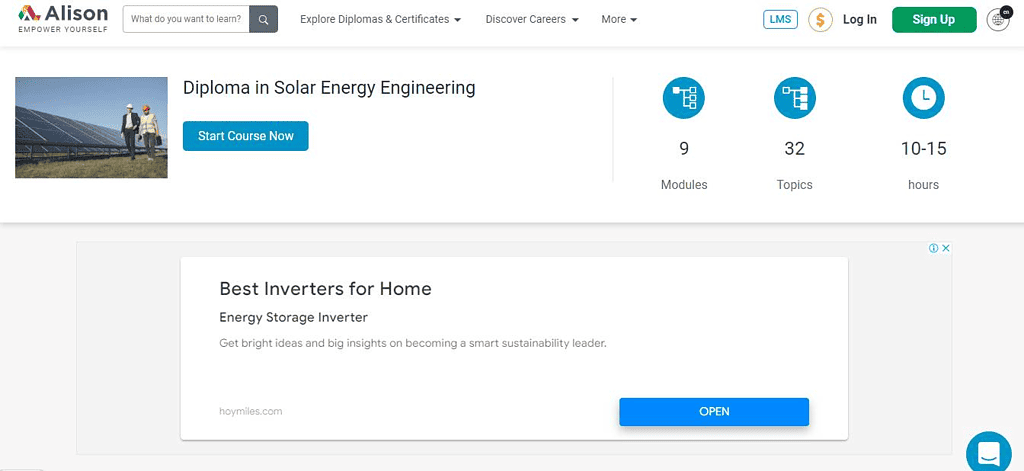
The Diploma in Solar Energy Engineering is a specialized program that provides comprehensive knowledge and skills in solar energy engineering. This diploma course will equip students with the necessary expertise to design, install, and maintain solar energy systems.
The course typically consists of modules covering different aspects of solar energy, including solar radiation, photovoltaic systems, standalone and grid-connected systems, and energy conversion techniques. Students learn about the fundamentals of solar energy, its harnessing and utilization methods, and the technical aspects of solar power generation.
The diploma program also focuses on practical applications and hands-on training to enhance students’ understanding and proficiency in solar energy engineering. It may include laboratory sessions, case studies, and real-world projects to provide practical experience designing and implementing solar energy systems.
Who Is Suitable For This Course?
The Diploma in Solar Energy Engineering is suitable for individuals interested in achieving a career in solar energy courses and renewable energy education. It is perfect for students with a background in engineering, physics, or a related field who wish to specialize in solar energy. This course is also suitable for professionals already working in the renewable energy industry who want to enhance their knowledge in solar energy engineering.
What Are The Features & Course Content?
- Introduction to Solar Energy: Solar energy is explained, including how it reaches the Earth and how humans can utilize it. The module covers the geometry and physics of the sun, its relationship with the Earth, and the different forms in which solar energy reaches us. It also provides an overview of collecting and storing solar energy for optimal utilization.
- Solar Radiation Geometry: This module measures and calculates solar radiation on different parts of the Earth. It covers terms, definitions, and angles associated with solar geometry. Various instruments and tools for measuring radiation, such as sun-path diagrams, are discussed. Numerical problems are provided to enhance understanding of the calculations involved.
- Solar Radiation Estimation: The estimation of solar radiation on horizontal and inclined surfaces under different climatic conditions is covered in this module. Empirical equations for predicting solar radiation availability are explained. Additionally, methods for calculating monthly averages of daily and hourly global and diffuse radiation are taught.
- First Course Assessment: This assessment allows students to review their learning and evaluate their knowledge and understanding of the first three modules. If the required grade is not achieved on the first attempt, students can retake the assessment until success is achieved.
- Fundamentals of Photovoltaic Systems: The basics of solar photovoltaic (PV) systems are covered in this module. Topics include construction, working principles, challenges, and maximizing electricity generation. The module also introduces the recent developments in solar energy conversion through third-generation PV modules.
- Standalone Photovoltaic Systems: This module focuses on standalone or off-grid photovoltaic systems. It covers these systems’ components, specifications, design considerations, and utility. Numerical examples are provided to aid in selecting components and the design process.
- Grid-Connected PV System: The design and construction of grid-connected photovoltaic systems are explained in this module. Components, specifications, design parameters, and system functioning are covered. Performance analysis of the designed system is also discussed, with numerical examples to reinforce component selection and matching.
- Second Course Assessment: This assessment evaluates students’ knowledge and understanding of modules 4, 5, and 6. Like the first assessment, students can retake it until the required grade is achieved.
- Course Assessment: This module is the final assessment for the entire course. It evaluates students’ overall knowledge and understanding of the topics covered in the Diploma in Solar Energy Engineering.
What Are The Duration And Price?
Duration and Price of the Diploma in Solar Energy Engineering course may vary depending on the institution or provider offering the program. Typically, the time of such diploma courses ranges from a few months to a year. It depends on the depth of the curriculum and the mode of study (part-time or full-time).
Pros:
- Career Opportunities: Solar energy engineering is an expanding field that graduates can enter after graduating from this program. It is in high demand for professionals with experience in installing, designing, and maintaining solar energy systems.
- Renewable Energy Focus: The program focuses on renewable energy, specifically solar energy. A diploma in sustainable energy provides individuals with knowledge and skills in a field that contributes to climate change and clean energy transitions.
- Practical Skills: Students gain practical skills in solar energy engineering, including understanding solar radiation, estimating solar energy availability, designing photovoltaic systems, and analyzing their performance. These skills are valuable in the industry and can be applied to real-world projects.
- Technological Advancements: The program covers recent solar energy conversion techniques developments, including the third generation of photovoltaic modules. It ensures that students stay updated with the latest advancements and technologies.
- Flexibility: The diploma program offers a comprehensive understanding of standalone and grid-connected photovoltaic systems. This versatility allows graduates to work in various settings, from off-grid installations to large-scale grid-connected solar power plants.
Cons:
- Limited Hands-on Experience: Some diploma programs may offer little hands-on training or practical experience, which can be crucial for successfully working in solar energy engineering.
- Competitive Job Market: The renewable energy sector, including solar energy, is becoming increasingly popular and competitive. It means job opportunities may be limited, and graduates may face strong competition for available positions.
What Are People Saying – Reviews
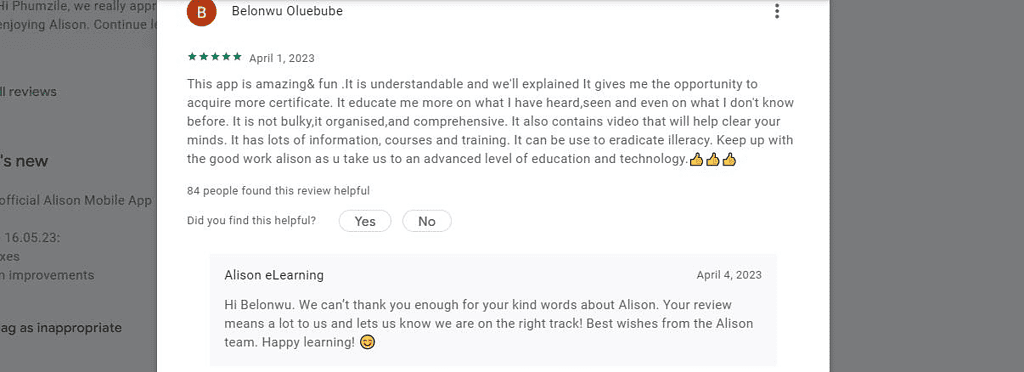
I’m very impressed with the Solar Energy Engineering program! I was seeking a program to teach students and me everything about solar energy, and this one fits the bill. The modules are well-organized and provide a great overview of the topic. The instructors are very passionate about solar energy, and they make learning fun. I highly recommend it.
Diploma in Solar Photovoltaics: Principles, Technologies & Materials
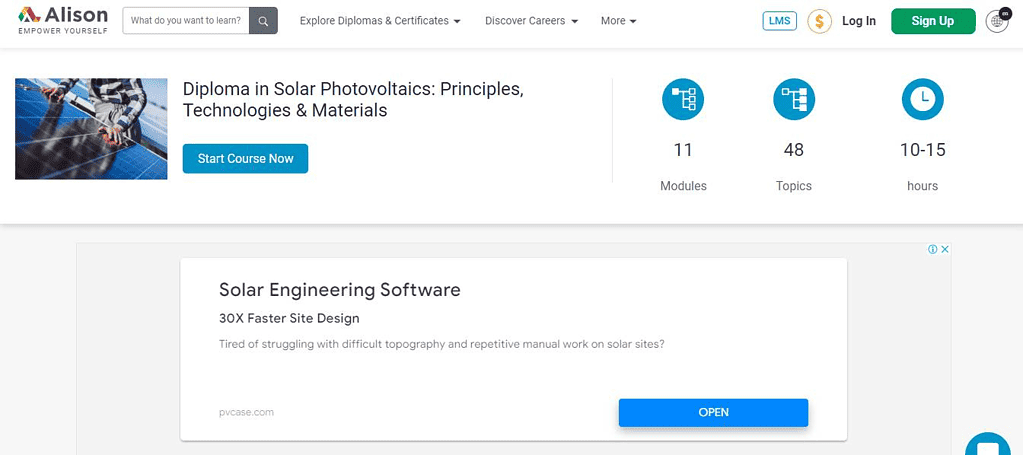
The Diploma in Solar Photovoltaics is a comprehensive course that covers the fundamental principles, technologies, and materials used in solar photovoltaics. It provides an in-depth understanding of solar energy and cells and their application in generating electricity from sunlight.
The course is divided into modules, each focusing on different aspects of solar technology. Individuals will learn about the basic principles of solar radiation, the structure and electrical properties of semiconductor materials, the characteristics and analysis of P-N junctions, the design considerations for solar PV devices, the manufacturing processes of different types of solar cells, and the challenges and advancements in third-generation PV technologies.
The course assessments test students’ understanding of the material, and a passing score of 80% or more is required to complete the diploma.
Who Is Suitable For This Course?
This course is best suited for individuals interested in achieving a career in the solar energy industry, those with solar jobs, or well-established and highly trained instructors who want to enhance their knowledge and skills in solar photovoltaics. It benefits technicians, engineers, energy professionals, and anyone who wants to contribute to the renewable energy sector.
What Are The Features & Course Content?
The course is divided into several modules, each focusing on specific aspects of solar photovoltaics. Here is an overview of the main modules:
- Introduction To Solar Energy: This module introduces solar energy, cells, and radiation. It covers topics such as quantifying solar radiation, atmospheric effects on solar radiation, and the impact of location and time on solar energy generation.
- Fundamentals Of Semiconductors: In this module, you will learn about the basic principles of semiconductors, including their structure and electrical properties. It also covers the measurement of solar radiation, sun-surface geometry, and sunrise, sunset, and day length calculations.
- Carrier Transport: This module explores semiconductors’ conductivity, resistivity, and carrier diffusion. It covers measuring resistivity, band diagrams, carrier generation and recombination, and total current in semiconductor materials.
- Diploma In Solar Photovoltaics: Principles, Technologies & Materials – First Assessment This assessment evaluates your understanding of the course material covered in the previous modules. It is necessary to score 80% or higher to pass the test.
- Semiconductor Junctions: This module focuses on P-N junctions, their characteristics, and the effects of bias on their behavior. It also covers the analysis of P-N junctions under dark conditions and the change in carrier density and potential.
- Essential Characteristics Of Solar Photovoltaic Devices: Here, you will learn about determining the I-V characteristics of solar photovoltaic devices under different light conditions. It covers the analysis of P-N junctions in light, boundary conditions, combining current yields, and efficiency calculations. Special cases, device characteristics, and the effects of irradiation are also discussed.
- First Generation Solar Cells: This module explores the circuit representation of solar cells, resistance variations, efficiency limits, and factors affecting the performance of solar PV devices. It also covers the evolution of solar PV technologies, design considerations, and methods to improve light absorption and reduce parasitic losses.
- Second-Generation Solar Cells: In this module, you will learn about the manufacturing processes of second-generation solar cells. It covers the production of silicon, deposition methods, and manufacturing techniques for CdTe and CIGS solar cells.
- Third-Generation Solar Cells: This module introduces third-generation PV technologies, including organic solar cells. It covers conductivity in materials, different types of organic solar cells, and their design considerations. Issues and challenges associated with organic solar cells are also discussed.
- Diploma In Solar Photovoltaics: Principles, Technologies & Materials – Second Assessment This assessment evaluates your understanding of the course material covered in the previous modules. It is necessary to score 80% or higher to pass the test.
- Course Assessment: The final module includes a comprehensive assessment of the course material to test your overall knowledge and understanding.
What Are The Duration And Price?
The course is estimated to be around 10-15 hours. However, the specific price of the program needs to be provided on the website.
Pros:
- Comprehensive Knowledge: The program provides a complete understanding of solar energy principles, technologies, and materials in photovoltaic systems.
- Industry Relevance: The diploma focuses on practical knowledge and skills required in the solar photovoltaic industry, making it relevant for those seeking careers.
- Career Opportunities: Graduates of this diploma program can pursue various career opportunities in solar energy companies, renewable energy consulting firms, research institutions, and government organizations.
- Flexibility: The diploma provides flexibility in terms of learning, allowing students to study at their own pace. It is beneficial for individuals who are working or have other commitments.
- Technological Advancements: Students can stay up-to-date with the latest advancements in solar cell technology with the program’s coverage of first, second, and third-generation solar cells.
- Sustainable Energy Focus: The diploma program emphasizes sustainable energy solutions, preparing students to contribute to the global transition towards clean and renewable energy sources.
Cons:
- Lack of Support: The course description needs to mention a provision for instructor support or interaction with fellow learners, which may hinder the learning experience and limit opportunities for clarification or discussion.
- Complexity: The course material may need to be more technical and complex for individuals with a background in physics or engineering, making it difficult for them to grasp the principles and concepts.
What Are People Saying – Reviews
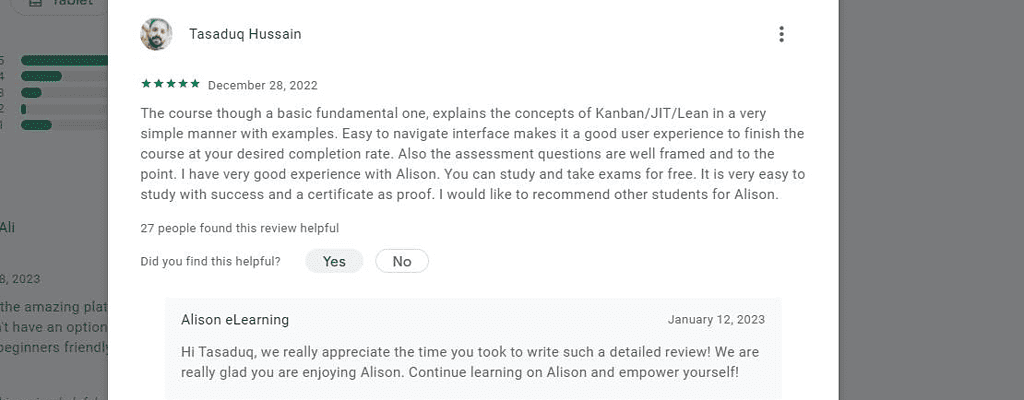
This course is perfect for those who want to be experts in solar energy. The modules are detailed and cover all aspects of the field. The practical applications and hands-on training are extremely useful and have greatly helped me in my job.

FAQ’s
What are the best online courses for the solar industry?
The best online courses for the solar industry can vary depending on individual preferences and specific learning goals. However, some popular and highly recommended courses include “Solar Energy Basics” by Solar Energy International, “Solar Photovoltaic Technology and Systems” by the Delft University of Technology, and “Solar Energy Engineering” by the University of New South Wales.
How do I select the right online course for the solar industry?
When choosing an online course for the solar industry, consider factors such as the course content, instructor expertise, accreditation or recognition, reviews and ratings from past learners, the flexibility of schedule, and any practical components or certifications offered. It’s also helpful to align the course objectives with your learning goals and career aspirations.
Are these online courses self-paced, or do they have set schedules?
Online courses for the solar industry can vary in terms of schedule. Some courses are self-paced, allowing learners to progress through the material quickly. Others may have set start and end dates with specific deadlines for assignments or exams. Reviewing the course details to understand the scheduling format before enrolling is important.
What are the prerequisites for enrolling in online solar industry courses?
The prerequisites for online solar industry courses can vary depending on the course and institution. Some solar energy courses may have no prerequisites and are suitable for beginners, while others may require basic knowledge in physics, engineering, or related fields. Reviewing the course requirements or contacting the state university or the course provider for specific prerequisites is recommended.
Can I get a certification upon completion of an online solar industry course?
Many online solar industry courses offer various solar certifications upon successful completion. These certifications can enhance your professional credentials and show your knowledge and skills in the field. It’s important to check the course details to see if a certificate is provided and if there are any additional training requirements to earn it.
Do employers recognize online solar industry courses?
Employers generally value online solar industry training courses from reputable and recognized providers for a skilled workforce. However, it is essential to research employers’ specific requirements and preferences in your target industry or region. Some employers may prioritize accredited programs or certifications, while others focus more on practical experience and skills.
Can I get a job in the solar industry after completing these courses?
Completing online courses in the solar industry can enhance your knowledge and skills, making you better prepared for job opportunities. However, securing a job ultimately depends on factors such as your qualifications, work experience, local job market conditions, and networking efforts. These courses can be valuable when combined with practical experience and relevant qualifications.
Conclusion
In conclusion, the review of the best online solar industry courses shows excellent opportunities for those interested in this field. These courses provide comprehensive knowledge and practical skills to succeed in the solar industry and contribute to a sustainable future. Whether you want to learn about solar technology, system design, or regulations, these courses offer specialized content for various career paths. Enrolling in these courses allows you to learn from industry experts and gain an advantage in the job market. With the growing demand for renewable energy, investing in solar industry courses is an intelligent choice that opens doors to exciting career options. Join the solar revolution by starting your educational journey today!

Aaron is an educational specialist focusing on jobs that can be performed outside of the standard office and anywhere in the world. Aaron has worked in the Real Estate industry most of his adult life in both commercial and residential. Financial Nomads was created to bring forward the best online educational courses and software reviews to help people live better lives. https://financialnomads.com
http://financialnomads.com/best-project-management-courses/

